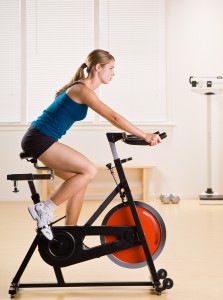There’s no single silver bullet to treat depression (not even aerobic exercise)
 Exercise And Depression Revisited (Neuroskeptic blog):
Exercise And Depression Revisited (Neuroskeptic blog):
“A new study has found little evidence that aerobic exercise helps treat depression, contrary to popular belief…Danish researchers Krogh and colleagues randomly 115 assigned depressed people to one of two exercise programs. One was a strenuous aerobic workout — cycling for 30 minutes, 3 times per week, for 3 months. The other was various stretching exercises…Both groups got less depressed but there was zero difference between the two conditions. The cyclists did get physically fitter than the stretchers, losing more weight and improving on other measures. But they didn’t feel any better…If this is true, it might mean that the antidepressant effects of aerobic exercise are psychological rather than physical — it’s about the idea of ‘exercising’, not the process of becoming fitter. This was a moderate sized study, and one study by itself doesn’t prove much — any more than one single political poll does. From personal experience I think there’s a good chance strenuous aerobic exercise can boost mood… but this is a reminder that the picture on exercise and depression is not quite as clear as the recent enthusiasm for it suggests…”
Study: Aerobic Exercise versus Stretching Exercise in Patients with Major Depression—A Randomised Clinical Trial (PLOS One). From the abstract:
- Conclusions: The results of this trial does not support any antidepressant effect of referring patients with major depression to a three months aerobic exercise program. Due to lower recruitment than anticipated, the trial was terminated prior to reaching the pre-defined sample size of 212 participants; therefore the results should be interpreted in that context. However, the DEMO-II trial does suggest that an exercise program for patients with depression offer positive short-term effects on maximal oxygen uptake, visuospatial memory, fasting glucose levels, and waist circumference.
NOTE: This does NOT mean that aerobic exercise doesn’t bring significant cognitive and emotional health benefits, as we have discussed multiple times before. It simply means that we should be realistic about expectations and that, for the time being, a multi-pronged approach to brain health may make more sense than relying on a single silver bullet–whatever that silver bullet may be (antidepressants, cognitive behavioral therapy, meditation, exercise…)
To Learn More:
- Exercise And Depression Revisited
- Physical Exercise and Brain Health
- A Multi-Pronged Approach to Brain Health
- Self-paced Course: How to Be Your Own Brain Fitness Coach
Pic courtesy of BigStockPhoto


